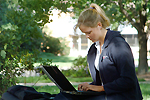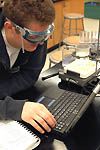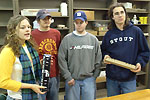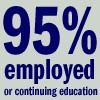Goal 2:
Preserve and enhance our educational processes through the application of active learning principles
e-Scholar program continues success
 UW-Stout was the first public university in Wisconsin to introduce students to a wireless laptop campus, and is in the company of 100 laptop universities nationwide. Still, Stout's e-Scholar program stands out even from these few by attempting to measure what the others are not -- how laptops add value to students' total experiences.
UW-Stout was the first public university in Wisconsin to introduce students to a wireless laptop campus, and is in the company of 100 laptop universities nationwide. Still, Stout's e-Scholar program stands out even from these few by attempting to measure what the others are not -- how laptops add value to students' total experiences.
During the past two years, surveys, focus groups and database studies that were conducted using standard, reputable methods provided key findings for the e-Scholar program:
Student Computer Use
Students in the e-Scholar program report high ratings on survey questions dealing with computer and Internet usage, the computer saving time, and computer use outside the classroom.
Students use their computers outside the class most often for schoolwork, e-mail, and as a research tool when accessing the Web.
Students in the fall 2002 and 2003 e-Scholar cohorts reported using their laptops in and out of the classroom more than they expected in certain areas. They reported using their laptops to do school work, take notes, research and access the Web, for personal use and entertainment, and for e-mail and to keep in touch with others.
A high percentage of students in the fall 2002 cohort reported using Blackboard, e-mail, e-Scholar and the Web site to access course material.
Faculty Perceptions
Faculty found that the digital environment has had a positive impact on students, especially in the realm of "active learning." In fact, faculty have found there has been more discussion, more questions, and that students seem more active, independent and willing to challenge themselves and to find answers.
In addition, faculty have noticed that students seem better prepared, and more equipped to learn on their own and to help each other learn. Because of the digital environment, students have greater access to assessment and greater access to notes before class.
Due to this new digital environment, faculty also adjusted the way they teach. They now make classes more interactive and find feedback -- in the form of easily accessible grades, e-mail comments and practice tests -- was given more regularly and quickly. Materials used in class are more frequent and up-to-date because of the ease of posting them, and accessibility of the instructor is greatly increased.
Year-to-Year Differences
Students in the e-Scholar program in the fall of 2003 cohort consistently reported higher ratings in satisfaction and proficiency levels than e-Scholar students in the fall of 2002 cohort.
Student Perceptions and Satisfaction
Students report that the ability to register online, having 24/7 access to a computer, and the ability to access the Internet from any location on campus are the most important to them.
Students in both 2002 and 2003 most often said they expected to use the computers to help them stay connected, learn cutting-edge technology, and as a tool for education.
Students also gave the portability of the laptops high ratings.
Student Proficiency
Students in the fall of 2003 cohort reported the greatest proficiency with Microsoft Word, followed by e-mail, PowerPoint and Excel, respectively.
As overall proficiency with Microsoft Word increases, students' levels of knowledge in various training areas increases.
Student Performance
A greater percentage of spring 2003 laptop students passed their courses than the non-laptop students enrolled in the same courses in spring of 2001 and 2002.
The way of the future
 When UW-Stout's laptop program pilot began, the chemistry department volunteered to create a section of freshman chemistry for laptop students.
When UW-Stout's laptop program pilot began, the chemistry department volunteered to create a section of freshman chemistry for laptop students.
Members of the department had just witnessed innovative laboratory methods at a Wisconsin Society of Science Teachers Convention. A presenter demonstrated how to use Vernier software and tools to record and graph data during experiments. The department elected to use the same technologies in the new chemistry laptop course.
Chemistry instructors then took on the responsibility of modifying the lab manual, both to introduce new experiments and to adapt several existing experiments to include laptop use. Pre-written experiments provided by Vernier offered ideas to incorporate into the experiments they were currently requiring.
The benefits of the software and tools are important to students:
- While conducting laptop experiments, students use LoggerPro software with special sensors to collect data. Their laptops automatically graph the information as they collect it.
- Students use a variety of Vernier collection tools during laptop experiments, including a conductivity probe, a spectrometer, a pH sensor, a heart rate monitor and a temperature sensor.
- Vernier software and tools supports both Apple and PC platforms. With a $100 investment in the LoggerPro software, all of the department's students are licensed to use it. Additionally, the department also invested approximately $10,000 in hardware.
- LoggerPro software not only helps students analyze the data, but also helps them create lab reports and replay the data collection at various speeds.
Chair design earns award
While conducting research to create a new product for infants and toddlers, UW-Stout industrial design student Matthew Wilcox decided to design an unusual chair for autistic children. His resulting design, called the "Shell Chair," earned him second prize and $1,500 in the Juvenile Products Manufacturers Association's Student Design Competition.
Although Wilcox is not personally acquainted with an autistic child, he became fascinated with improving the design of the classroom equipment currently used by four- to seven-year-old children with autism.
Wilcox's new "Shell Chair" design doubles as a toy. This, he said, allows it to be easily integrated into any classroom while lessening the stigma autistic children may face when they need to use it.
The design includes a rounded outer shell that children can remove from the compression chair, flip it over and play inside it, similar to how they would play in a fort. Because autistic children typically enjoy rocking, the outer shell is also curved to allow children to rock gently back and forth, while the chair inside the shell applies pressure to their body.
Wilcox created both a computer model and a cardboard prototype of his design, and tested the prototype with a four-year-old child. He envisions producing the chair out of the same hollow, molded, colorful plastic that many children's toys are made from.
The JPMA competition was open to industrial design students enrolled in degree programs at universities affiliated with the Industrial Designers Society of America. The judges, who are IDSA member designers, critiqued each submission based on design, research and ergonomics.
Packaging students take bronze
 Four UW-Stout students received a bronze award from the National Paperbox Association for their golf ball package design.
Four UW-Stout students received a bronze award from the National Paperbox Association for their golf ball package design.
The graphic design students designed the package for a new premium line of Peerless 20/20 golf balls for Acculine Inc. They placed third out of approximately 50 other entries.
NPA and the Paperbox Industry Foundation host this National Student Design Competition each year. UW-Stout students have received both silver and bronze awards for their designs three out of the past four years they have entered the competition.
Acculine challenged the students to design a folding paperboard carton that would offer adequate protection to their product, reduce post-consumer waste, pack and display easily, and contain at least six balls to minimize cost.
The students received plaques and a $100 award from NPA for their accomplishment.
Graduates finding success
 A total of 95 percent of December 2002, and January, May and August 2003 UW-Stout graduates were employed as of January 31, 2004, according to the annual employment report issued by the Career Services Office.
A total of 95 percent of December 2002, and January, May and August 2003 UW-Stout graduates were employed as of January 31, 2004, according to the annual employment report issued by the Career Services Office.
Of those employed, 76.4 percent reported employment in, or related to, their major. The median salary reported by these recent graduates was $31,000.
The Career Services Office also reported the progress of the Cooperative Education program. In all, 610 students participated in the program, with more than 400 employers providing job sites. Survey participants reported average earnings of $11.42 per hour while on co-op assignments.
(Figure 1)
Additional Resources:
- e-Scholar Program
Student computer use references:
1. Student's Entry Expectations Versus Reported Use [PDF]
http://www.uwstout.edu/bpa/ir/laptop/entry.pdf
2. Learning Effectiveness From A Student's Perspective [PDF]
http://www.uwstout.edu/bpa/ir/laptop/learning.pdf
3. One Minute Survey [PDF]
http://www.uwstout.edu/bpa/ir/laptop/onemin03.pdf
Faculty perceptions reference:
http://www.uwstout.edu/cas/english/stoutteachnet/assesscoursemanage.htm
Student perceptions and satisfaction references:
4. Student Questionnaire Survey 1 [PDF]
http://www.uwstout.edu/bpa/ir/laptop/sqs103.pdf
5. Student Questionnaire Survey 2 [PDF]
http://www.uwstout.edu/bpa/ir/laptop/sqs2.pdf
6. Training and Expectation Report 2002 [PDF]
http://www.uwstout.edu/bpa/ir/laptop/training.pdf
7. Training and Expectation Report 2003 [PDF]
http://www.uwstout.edu/bpa/ir/laptop/training03.pdf
Student proficiency references:
8. Microsoft Office Proficiency Self-Assessment [PDF]
http://www.uwstout.edu/bpa/ir/laptop/microsoft.pdf
9. Student Questionnaire Survey 1 [PDF]
http://www.uwstout.edu/bpa/ir/laptop/sqs103.pdf
Student performance references:
10. DWF Analysis for Spring 2003 Courses [PDF]
http://www.uwstout.edu/bpa/ir/laptop/dwfexec.pdf - Career Services Information
Annual Employment Report
http://www.uwstout.edu/careers/anrpt.pdf
Co-op Annual Report
http://www.uwstout.edu/careers/cooprpt.pdf
